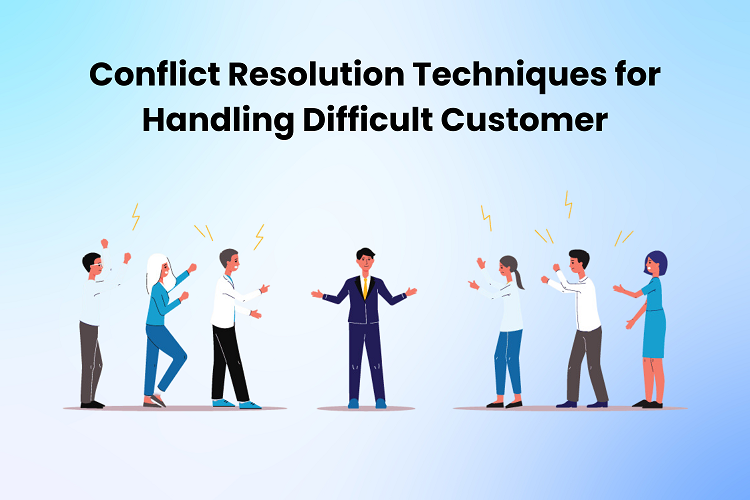
Conflicts in customer service are unavoidable. Knowing how to resolve conflicts effectively is essential whether you’re in charge of a group of people or have direct contact with clients. In this blog, we will delve into the nuances of dealing with challenging clients, revealing techniques refined over years of Customer Service Training and the development of critical Customer Service Skills.
Table of Contents
The Essence of Customer Service Training
Managing challenging clients requires a thorough understanding of the dynamics involved. Training in customer service builds the foundation for a staff capable of deftly managing difficulties. It imparts the abilities needed to resolve disputes amicably, guaranteeing that each encounter enhances the customer experience.
The Core of Conflict Resolution
Empathy becomes your hidden weapon in customer service when diffusing difficult circumstances. Finding common ground begins with comprehending the customer’s viewpoint. To facilitate a more seamless resolution process, customer service training strongly focuses on the value of active listening and acknowledging the client’s emotions.
Navigating Tensions with Effective Communication
The key to resolving conflicts is effective communication. Teach your staff customer service techniques that promote polite, concise, and transparent communication. Promote the skill of paraphrasing effectively, using positive words, and attentive listening. This relieves the customer’s uneasiness and makes them confident that their concerns are being taken seriously.
De-escalation Techniques
De-escalation tactics are essential for defusing tense situations and should be covered in customer service education. Instruct your group to avoid using combative language and to maintain composure. Putting a methodical de-escalation procedure in place gives your team a defined approach and aids in regaining control over difficult situations.
Finding Common Ground
There must be tact while juggling the consumer’s demands with corporate regulations. Give your staff customer service abilities that promote reaching consensus. This entails looking into different options, making necessary concessions, and ensuring the client feels heard and appreciated at every stage of the procedure. When mastered, this delicate dance can convert an unhappy customer into a devoted supporter.
Escalation Protocols
Sometimes, disputes get out of hand faster than the front-line staff can handle them. Clear escalation policies that instruct staff members on when and how to alert higher authorities should be part of customer service training. Creating a smooth handover procedure guarantees that complicated problems are resolved quickly, letting clients know their issues are taken seriously.
Learning from Feedback
The world of customer service is dynamic, and learning from every encounter is important. Urge your staff to see consumer feedback—even unfavourable—as a chance for improvement. Effective customer service training instils a continual improvement mindset in your staff, enabling them to grow as professionals and adjust to the constantly shifting demands of their clients.
Embracing Technological Advancements
Customer service abilities in the digital age go beyond conventional approaches. Examine how using technology can improve the resolution of disputes. The customer care experience may be entirely transformed by putting AI-driven chatbots, data analytics for customer insights, and efficient communication platforms into place. Give your staff the tools they need to traverse this new digital terrain successfully, guaranteeing a quick and easy resolution process.
Cultural Competence
Gaining a grasp of numerous cultural nuances becomes imperative for firms expanding abroad. Modules on cultural competency should be included in customer service training to help your team recognise and accept different viewpoints. By acknowledging and adjusting to cultural variations in communication preferences and standards, your team will be far more successful in settling disputes with clients from various backgrounds.
Crisis Management
Unexpected crises can provide particular difficulties, even though routine disagreements are a customer service component. Include crisis management in your customer service training to equip your staff to handle unanticipated situations. A well-prepared team can handle crises with fortitude, preserving customer faith even in the face of hardship, from product recalls to PR problems.
Personalised Service
You may go beyond simple fixes by adding individualised service to your conflict resolution plan. The ability to create customised solutions for customers demonstrates a dedication to meeting their specific demands. Teach your staff to recognise and resolve special issues so that clients feel valued for the tailored care they receive.
Conclusion
The peace that may be reached in conflict resolution through customer service training and refined customer service abilities is unmatched. Your team can turn difficult situations into chances to provide excellent customer service by fostering empathy, clear communication, de-escalation strategies, and a dedication to ongoing development. As you manoeuvre through the intricacies of customer interactions, keep in mind that dispute resolution is an art that, when perfected, raises the bar for customer service.

